
Recently, Associate Professor Zhu Yu of the School of Economics of Renmin University of China (RUC) published an article titled “Bank Market Power and Central Bank Digital Currency: Theory and Quantitative Assessment” in the Journal of Political Economy, one of the top international academic journals in the field of political economy.
Zhu Yu’s main research fields include monetary economics and econometrics. His research results published in the Journal of Political Economy, Journal of Econometrics, Review of Economic Dynamics, Quantitative Economics, Journal of Money Credit and Banking, Journal of Economics and Dynamic Control, and other well-known international economic journals.
Abstract
This paper develops a micro-founded general equilibrium model of payments to study the impact of a central bank digital currency (CBDC) on intermediation of private banks. If banks have market power in the deposit market, a CBDC can enhance competition, raising the deposit rate, expanding intermediation, and increasing output. A calibration to the US economy suggests that a CBDC can raise bank lending by 1.57% and output by 0.19%. These crowding-in effects remain robust, albeit with smaller magnitudes, after taking into account endogenous bank entry. We also assess the role of a non-interest-bearing CBDC as the use of cash declines.
For more details, please refer to https://www.bankofcanada.ca/wp-content/uploads/2019/05/swp2019-20.pdf.


